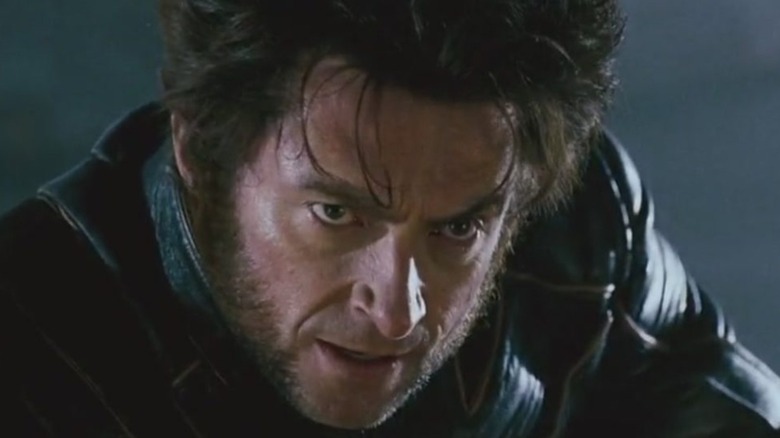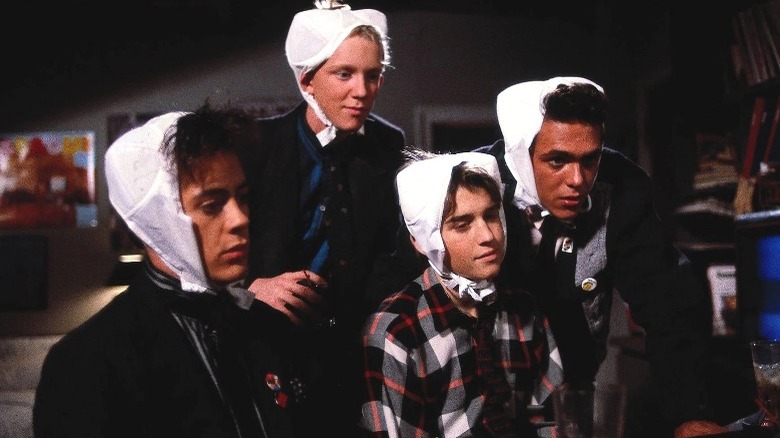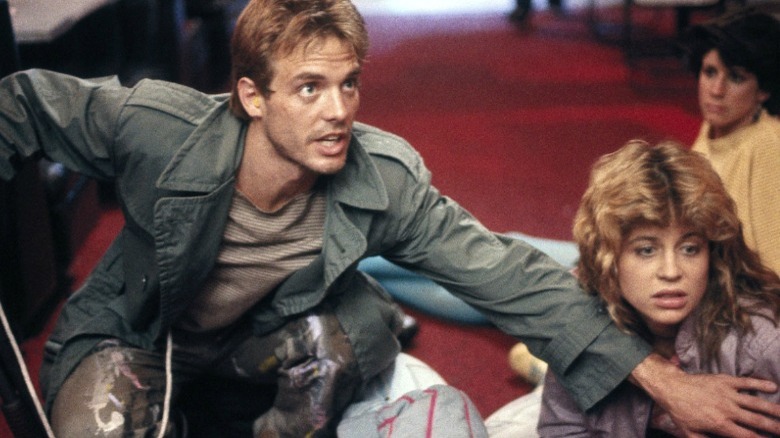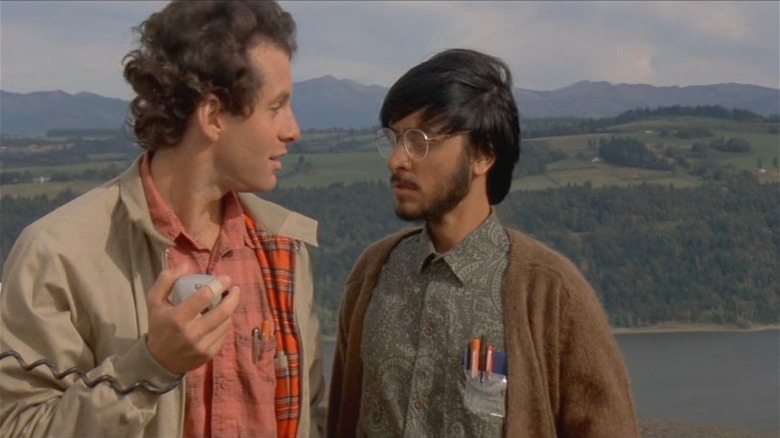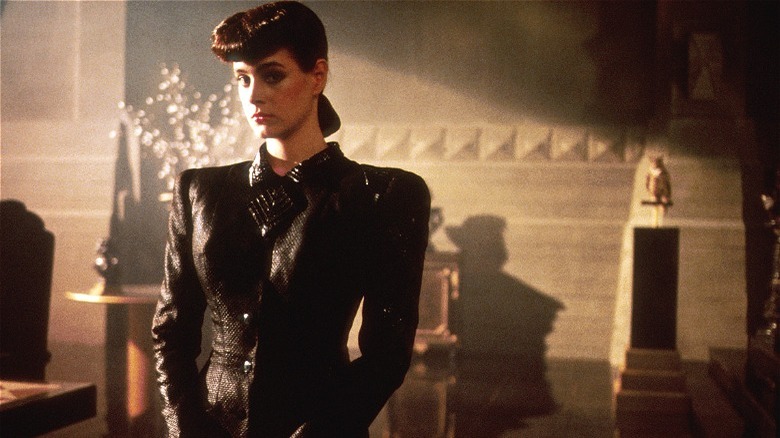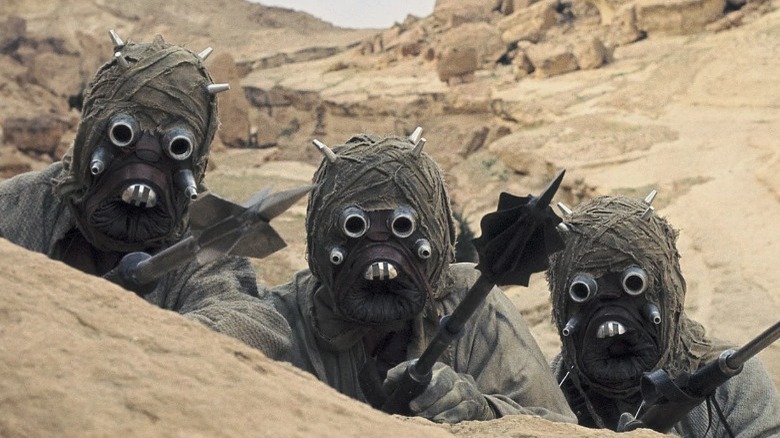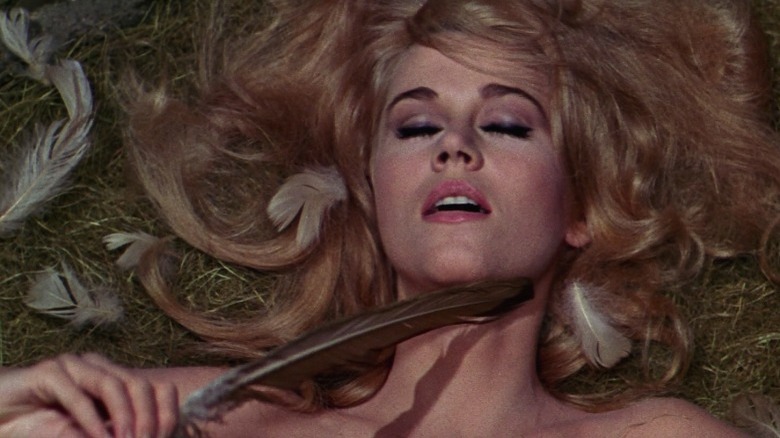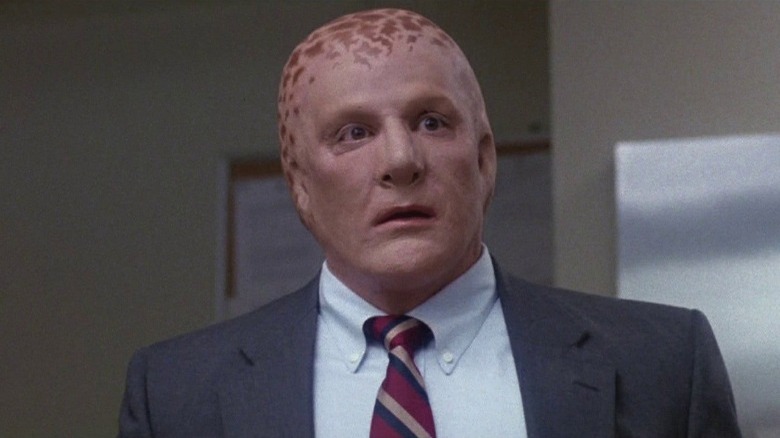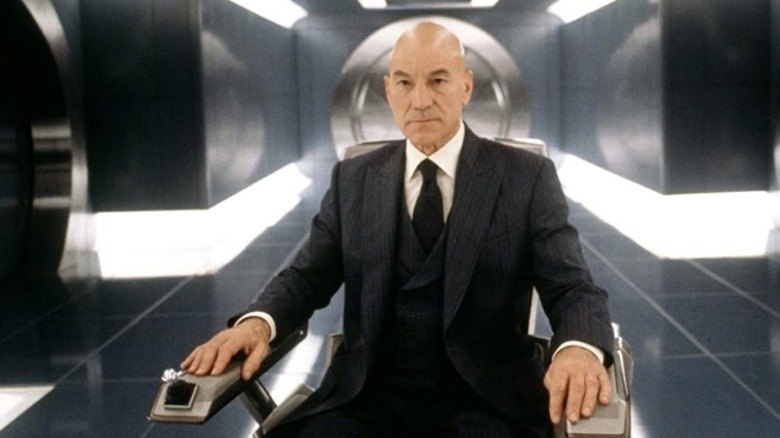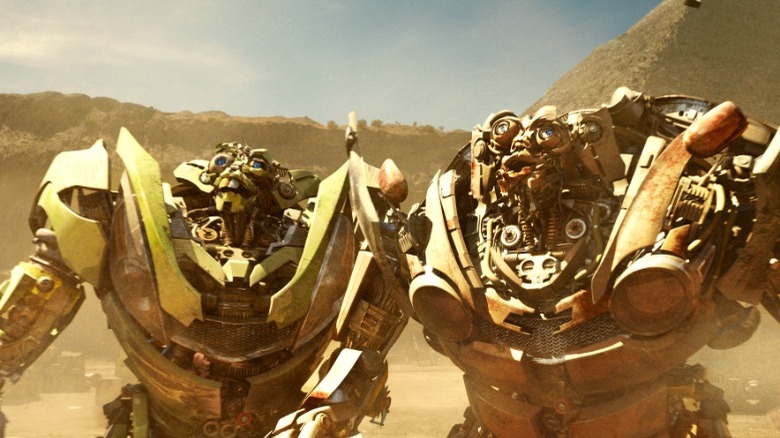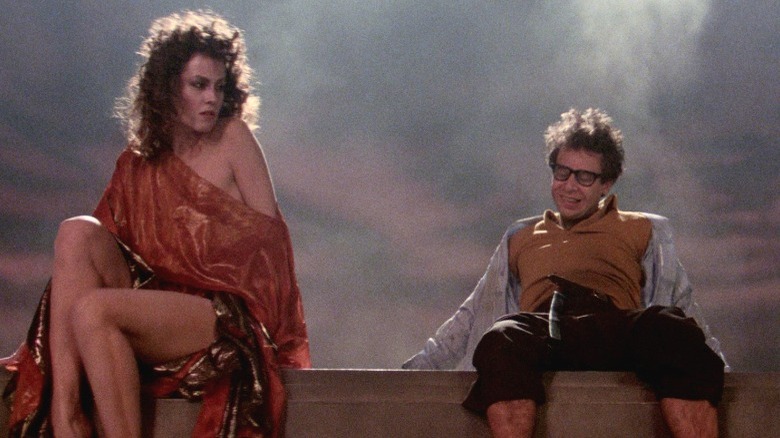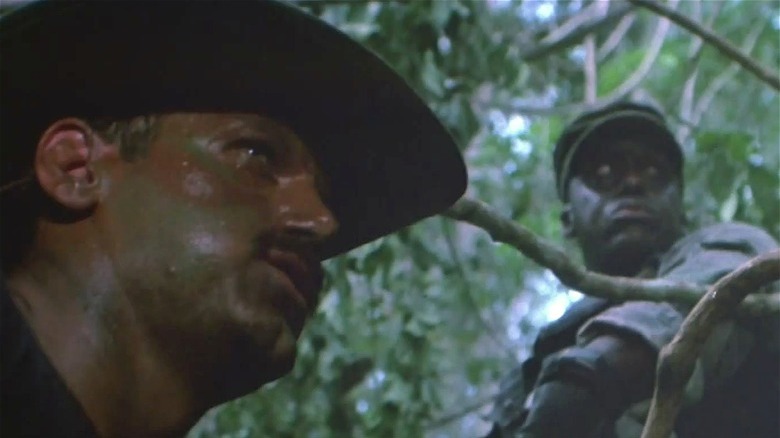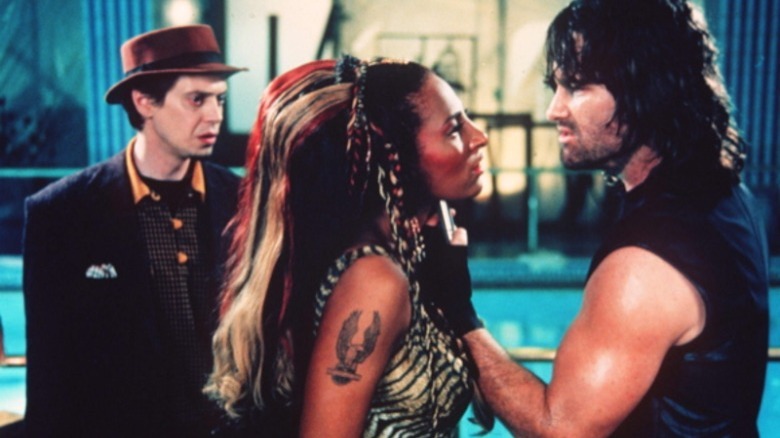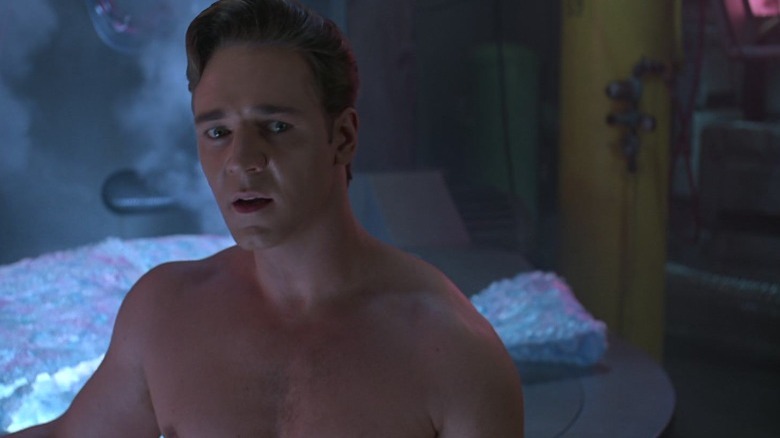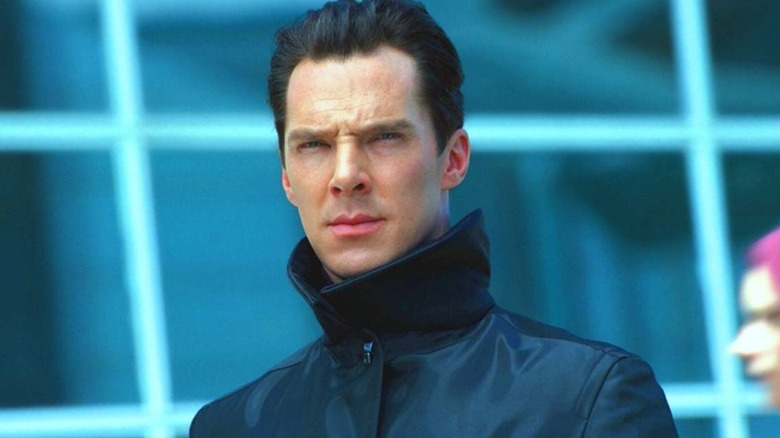Sci-Fi Movies That Didn't Age Well At All
(This article may have triggering content, including discussions of sexual assault and racism.)
Every geek has at least one sci-fi movie they grew up with and later rewatched only to find out that some stuff in that movie doesn't feel great anymore. That doesn't mean we're bad people for ever having enjoyed these films. All it means is that we've grown up. The conversations we've had since these movies were in their prime have bettered our expectations for new movies, which is why it's important to talk about some of these well-loved films that have troubling elements in them.
This doesn't mean we have to stop loving these problematic movies. It's possible to critique something that once gave us comfort and still keep it with us because of our love for it ... or not love it anymore if that's better for you. Moving away from some of these old jokes, bad tropes, and controversial casting choices also doesn't mean movies are going to turn soft and boring. The audience is more welcome than ever, and that's a great thing because the more we learn about ourselves, the bigger and better our science fiction can become. Here is our list of sci-fi movies that didn't age well at all!
If you or anyone you know has been a victim of sexual assault, help is available. Visit the Rape, Abuse & Incest National Network website or contact RAINN's National Helpline at 1-800-656-HOPE (4673).
Weird Science (1985)
Lots of 1980s films were less than enlightened in their portrayal of women. Sexy teenage boy fantasies were a virtual industry unto themselves, and films like "Porky's" and "Revenge of the Nerds" were so comfortable with casual sexual assault that we can't laugh at them anymore. Science fiction didn't skip out on this trend with John Hughes' teen flick "Weird Science."
There's a lot to still like about this movie, including Bill Paxton as the jerky brother Chet and the boys' horny teenage behavior is a far cry from the sexism in similar films. Lisa is the ideal woman, portrayed by Kelly LeBrock. She's an AI imprinted onto a mannequin, but she's still bound to the whims of a pair of hormonal teens. Lisa's agency always comes down to serving their needs. It's a relief that what these two mostly need is a jolt of confidence, but by the end of the film, Lisa is still a servant out to help other teenage boys lift their self-esteem. She even cleans the house before she's off to her next mission. It's a rehash of how it's a woman's job to "fix" the men in their lives or mother their own partners.
The Terminator (1984)
For fans, "The Terminator" is still a milestone of sci-fi horror, with Arnold Schwarzenegger's unstoppable killing machine on the hunt. From the viewpoint of Sarah Connor (Linda Hamilton), though, it's a two-fold nightmare of stalking. The T-800 cuts its way through several women before it draws close to its correct target. It infiltrates her house, kills her friends, steals her family's information, and is willing to kill her anywhere, even in public.
Meanwhile, Kyle Reese (Michael Biehn) has imprinted his fantasy idea of Sarah onto a photograph given to him by her future son John Connor. Kyle is willing to sacrifice himself to meet his fantasy woman, but he has to abduct her without explanation, despite her terrified and flailing defense. Within two days, Sarah's just as obsessed with her well-meaning but frightening captor, and thus the future is saved via an awkward sex scene. "The Terminator" remains a great movie, with terrific effects and Schwarzenegger's sheer implacable presence. However, the abduction-as-romance angle remains badly executed. Please, don't try this dating tactic at home.
Short Circuit (1986)
"Short Circuit" is a sweet-natured movie about a robot that becomes sentient and decides he doesn't want to hurt people. Johnny 5, as the robot names himself, runs away from the military installation that created him and takes shelter in the home of a bookish young woman played by Ally Sheedy. Johnny is tracked down by his creator Newton, played by Steve Guttenberg.
Today it's still a cute movie, but it's less than great that white actor Fisher Stevens plays Ben Jabutiya, an Indian engineer. Stevens, who'd originally been hired to play a white graduate student, involved himself in attempting a fair and nuanced portrayal of Jabutiya, and his efforts do come through in the finished film. Since then, Stevens is open about his regrets in taking on a role that should have gone to an Indian actor. The process of playing Jabutiya involved darkening Fisher's skin, which is unavoidably an example of racist brownface. Fisher sat with Aziz Ansari in 2015 and talked about being a young actor in need of a job, and of industry injustice that's still all too frequent. It was a necessary conversation, handled well.
Blade Runner (1982)
"Blade Runner" will always be a classic. It's the masterpiece that helped put the visual power of cyberpunk stories on the map, but that doesn't mean it's without critique. The glorious but depressing near-future Los Angeles relies on borrowing the chic aesthetic of a neon-lit Japan, but the city itself is bare of the diversity that this port town displays in real life. It's a topic of frequent and necessary discussion, but there's also a little more to "Blade Runner" that doesn't feel great.
The budding romance between Rachel and Rick Deckard is based, like much of the story, on noir tropes. That means gruff, manly men pulling their desired partners into passionate clenches that are only consented to afterward when the lady admits she actually wanted it. That's already scary and tiring for women, but tensions on the set between Harrison Ford, Sean Young, and Ridley Scott add extra vehemence to a scene where Deckard shoves Rachel against the wall in desire. It's an uncomfortable scene to watch even without knowing the details about the film's production.
Star Wars (1977)
As a whole, "Star Wars" has finally begun the work of rehabilitating how it portrays some of its alien cultures. While the obvious argument is always "it's fiction," there are very few societies in fiction that don't draw from real life. Like George R. R. Martin's Dothraki, who borrowed elements from Mongolian history, "A New Hope" also took its inspiration from nomadic cultures. The Tuskens were designed around the Bedouins, Arabic nomads with centuries of complex history.
In "A New Hope," the Tuskens were relegated to savage stereotypes, raiders that stole from the villages that encroach on their territory. "Star Wars" has since done the work of rehabilitating how it treats Tatooine's indigenous culture, with big roles and social exploration in the Legends novel "Kenobi" by John Jackson Miller, as well as during both "The Mandalorian" and "The Book of Boba Fett." Temuera Morrison goes the extra mile to add Maori elements to the tribal culture, and Deaf actor Troy Katsur gave the Tuskens a real language. However, with Boba Fett's family band of Tuskens all brutally killed off for shock value, it's clear there's still a ways to go.
Barbarella (1968)
Campy classic "Barbarella" brings a French comic book to life, with Jane Fonda as its title character. As a story that leans all the way into its sexiness, we're not here to pick on this flick for being too horny. That'd be like being mad at pizza for existing, with all its gooey, cheesy goodness. "Barbarella" portrays sexuality with the literal innocence of angels. It's pretty healthy, overall, except for one scene that may work in context but still puts a sour taste on the whole affair.
Late in the film, Barbarella is searching for Dr. Durand, the villainous figure that could ruin Earth's long peace. As she gets close to her target, she falls into a trap set by the disguised baddie, and he's prepared to kill our heroine off. The method? A machine whose crescendo is meant to end life via excessive pleasure. It's the only situation where Barbarella can't reasonably consent to what's going on, due to the power dynamic, meaning that Durand intends this machine to rape a woman to death. The innocent Barbarella does survive the machine, of course, but it's a pretty dark moment in an otherwise light film.
Alien Nation (1988)
Starring James Caan and Mandy Patinkin, "Alien Nation" is Hollywood's best science fiction homage to "In the Heat of the Night." Upfront about its themes of cultural and racial integration and segregation, the flick uses the alien Tectonese (or Newcomers) to stand in for real-life bigotry. Caan plays the old-fashioned Detective Sykes, a man of hard prejudices who gradually accepts his new alien partner, Sam Francisco, while they chase down the roots of a terrifying new criminal empire.
The film's willingness to talk about its big themes in between its hard-boiled action makes its opening absolutely bizarre. Francisco replaces Sykes' original partner, Tuggle, who was killed in the crossfire of a Newcomer street fight. Tuggle's death is a by-the-numbers example of "The Black Guy Dies First," an exhausting and unnecessary trope that portrays Black men — and other minority groups — as disposable to empower the actions of a white lead. It's a big mistake that leads to the movie trying to make its case about the cruelties of racism without the presence of any major Black leads at all.
X-Men Franchise (2000-2020)
The "X-Men" franchise comes down to a reviled minority trying to survive, so it's staggering to see this Civil Rights-inspired world continually makes problematic mistakes, as ableism mars the series from the outset. Wolverine may not be the most enlightened dude, but it's still incredibly insensitive for him to suggest in the original "X-Men" film that Professor X's mutant codename should be "Wheels." That's a huge detail about Xavier, a real-world disability that makes the legendary telepath a hero to the disabled community.
"X-Men: The Last Stand" is also infamous for the scene in which Storm, a mutant with a power that makes her godlike to many, tells Rogue that she should be proud despite the fact that Rogue's mutation leaves her totally disenfranchised from the human experience. That's a miss for intersectionality and conversations about privilege. Then, for a capper, there's Darwin's unnecessary death in "First Class." A young Black mutant with the ability to adapt to any situation is somehow unable to overcome Kevin Bacon's attack and dies gruesomely. Yet again, "The Black Dude Dies First" in a series that's supposed to be about overcoming that. Yikes.
Transformers: Revenge of the Fallen (2009)
Two names ought to inspire rage in any "Transformers" fan, and we don't mean Michael and Bay. One name is Skids, the other is Mudflap. Appearing only in "Revenge of the Fallen," these characters are a stew of horrible stereotypes. In a 2009 article, Slashfilm called these two out as minstrel show stereotypes, and the franchise is still marred by the way its producers Roberto Orci and Alex Kurtzman, director Michael Bay, and even the voice actors pass around this mistake like a hot potato.
Skids has a gold tooth mashed into his messed-up grill, and Mudflap speaks in a mutilated version of AAVE (African American Vernacular English). The pair are depicted as uneducated, semi-illiterate, and chunky. It's hard to miss what they're intended to resemble, and there's nothing good about it. The live-action "Transformers" movies are full of immature gags that are a staple of Bay's style of filmmaking, but these two robots remain the worst thing about a franchise that's long since veered off the road of good taste.
Ghostbusters (1984)
"Ghostbusters" fans have grown up with the franchise since the first movie's premiere in 1984. It's a sci-fi comedy classic, starring Bill Murray in the prime of his career, and it's comfort food we can't ever quite recreate. The franchise is back and hotter than ever, but as wonderful as the original movie still is, it's not perfect.
Some movie fans were rightfully upset about 2020's "Wonder Woman 1984" and the way it treated Steve Trevor's storyline. Diana's dead lover is put into a body without the host's consent, and critics were aghast at the implications of this. A similar scenario mars "Ghostbusters," only worse, and it's time to scrutinize it. Dana (Sigourney Weaver) and her nerdy neighbor Louis have their bodies hijacked by demons. To release Gozer the Gozerian, these demons (the Keymaster and the Gatekeeper) must mate. The act itself isn't seen, but the sexual implications are clear in how both of them look afterward, and in their pretty obvious titles. The body-swap trope may be a hallmark of '80s comedy, but it's not a trope we need to keep promoting or protecting.
Predator (1987)
"Predator" remains one of the manliest movies in history, a chart-topper of studly do-right action matched only by films like "The Northman" and "Gladiator." This tightly-paced jungle cruise pits a group of military men against an alien hunter that's already wiped out a squad of Green Berets and a whole lot more. Only Arnold Schwarzenegger is a bad enough dude to fight this thing one-on-one and possibly survive.
The behind-the-scenes work on "Predator" was just as beefy, with the cast doing their best to one-up each other. It shows on the screen. No one will ever take this film off the list of coolest movies of all time, although its insistence on its own manliness goes overboard when Jesse Ventura's character, Blaine, casually drops the f-slur when his teammates don't want to share his tobacco chew. It's not a moment that ruins the movie, but today more than ever that bigoted remark reeks of the kind of insecurity that we've long since gotten tired of.
Escape From L.A. (1996)
John Carpenter's early films are progressive in a lot of ways, featuring diverse casts, female leads, and resistance against racism and authoritarianism. "They Live" benefits from the equality between Roddy Piper and Keith David, and "Big Trouble in Little China" avoids some ugly racist pitfalls. So the flaw we're about to point out in one of his biggest cult films isn't a call-out on Carpenter, but an example of the way our dialogue has changed for the better.
"Escape From L.A." brings Snake Plissken back to snub his nose at the people in power. On the way, he meets new exiles from society, including a Muslim woman whose faith is reviled by the theocratic President. His coolest ally is Hershe Las Palmas. Hershe's a badass, a woman through and through, but Snake first met her before the movie starts when Hershe was still living as someone assigned male at birth. Snake respects Hershe and her abilities, but he does keep using her deadname, even after she reminds him otherwise. Today, a cool dude like Snake would work on using his ally's real name, out of that same respect he had for her in 1996.
Virtuosity (1995)
Denzel Washington is capable of being in some bad movies, but he always turns in a good performance. However, in 1995 he was outclassed by an early Russell Crowe in the so-awful-it's-fun "Virtuosity." Crowe understands the assignment, playing an AI loaded up with the recreated minds of every serial killer his creator can cram onto a high-capacity USB. As SID 6.7, Crowe chews up the scene once he's loose, and he's at his hammy best when he takes a nightclub hostage.
"Virtuosity" gets out of hand early on when SID's creator convinces another scientist that he can upload his favorite VR sex kitten onto a cutting-edge android body. It's another riff on "Weird Science" in that this socially stunted figure doesn't think about his creation as a person, just something to be used. It's a motif that "Ex Machina" later explores with a lot more thoughtfulness, but here it's just another gross example of how some men prefer their women to be "gynoids." This scientist does pay for his lust when SID comes out of the vat instead of his sex bot, but it's still unnecessary objectification.
Star Trek Into Darkness (2013)
Khan Noonien Singh is one of the biggest antagonists "Star Trek" fans love to hate. A major player in the Eugenics War that decimated Earth long before the rise of the Federation, this enhanced human escaped into space where Captain Kirk encountered him in the original series episode "Space Seed." Played by Ricardo Montalban, Khan would reprise his role in "Star Trek II: The Wrath of Khan." Montalban built a terrifying lineage that's still part of today's canon, and in the '70s it was enough of a struggle with studios to cast anyone non-white for a major role.
Benedict Cumberbatch may be a bigger actor than the late Ricardo Montalban, but the news that he was cast in the second J.J. Abrams-helmed "Trek" film was quickly met with concern when his "mysterious" villain was theorized to be a new version of Khan. Sure enough, this excellent but bone-white actor was, in fact, Khan. This time, though, the casting was met with loud pushback, especially from Khan's real-life homeland, who was rightfully angry at the loss of a meaty, fun role that could have gone to any one of India's excellent actors.
